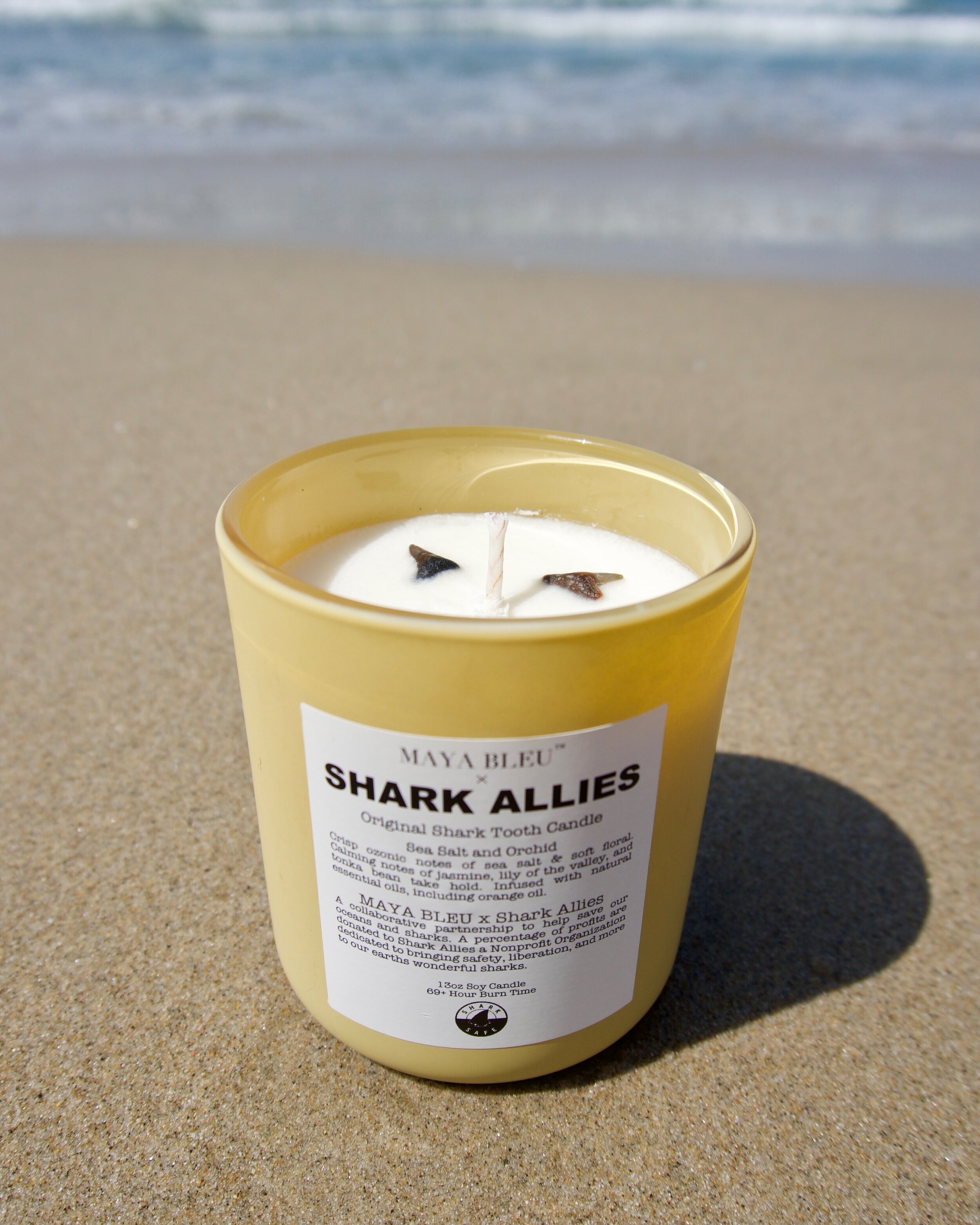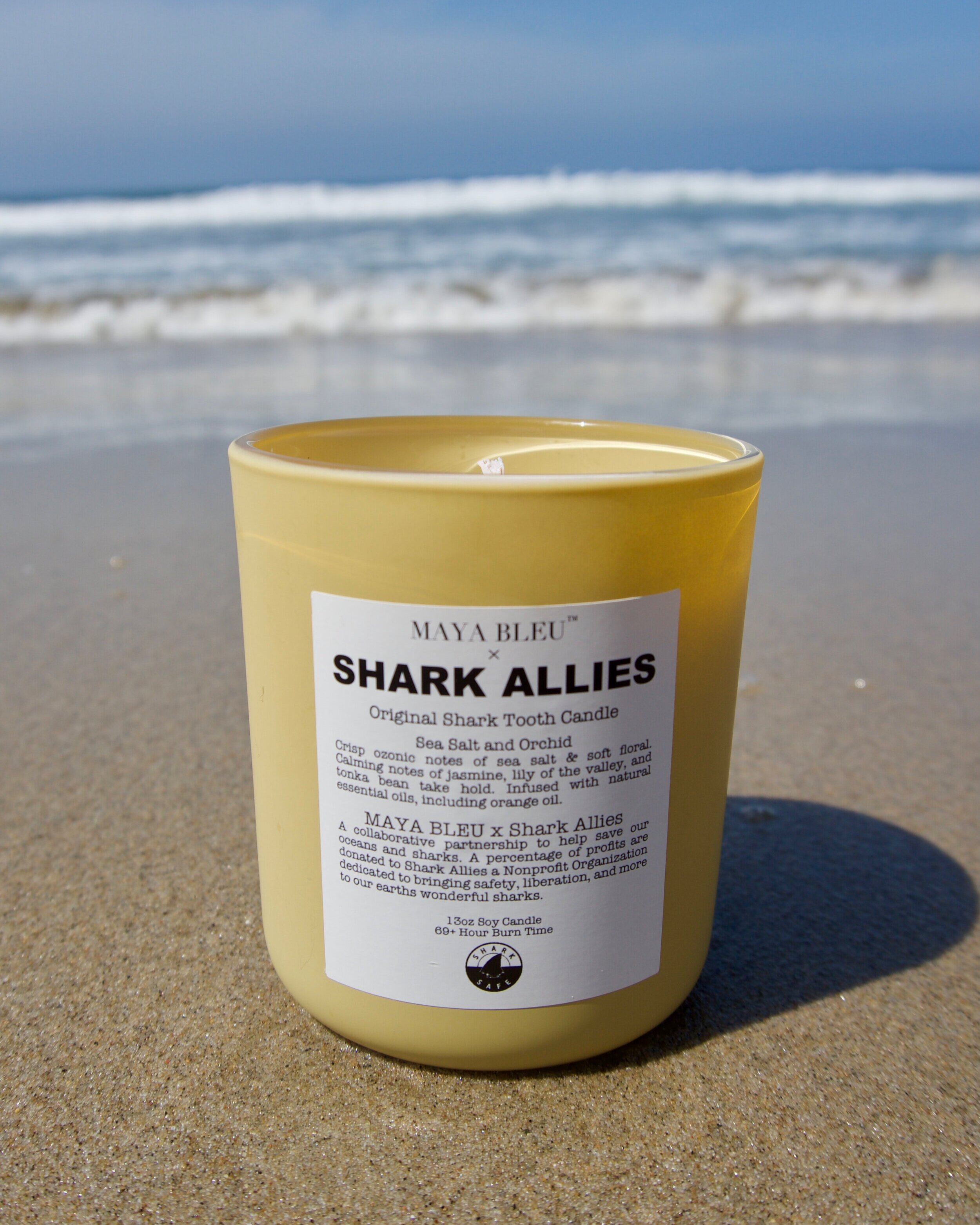Sustainable Spotlight: Maya Bleu
It may seem like Maya Bleu appeared overnight, popping up across any ocean-lovers social media pages, all to immediately establish a loyal following. But CEO and Founder, Mason Silvia was developing a mission behind the Original Shark Tooth Candle for years prior to launch. Silvia, a passionate shark and coral reef advocate out of Key West, with a Bachelor’s in Alternative Renewable Energy, has bigger plans for Maya Bleu: to eventually build a research center to explore new sustainable resources our environment has to offer and use them to create a family of eco-friendly products. Even more, the Maya Bleu team dreams of an ocean research lab to grow corals, help fish populations through aquaculture, and promote tours for youth and adult education. Safe to say, Maya Bleu isn’t your average luxury candle company…
Maya Bleu and Shark Allies teamed up a year ago to launch the first collaboration of our relationship, a candle in Representative Kristin Jacob’s favorite scents to fund a mural in her honor, painted by Kelly Quinn (@kellyofthewild). Read more about Kelly’s project here. This summer, we are proud to continue the partnership with the launch of a brand new candle, Sea Salt & Orchid in the Shark Cafe signature sand shade. In every Maya Bleu candle are four fossilized shark teeth that were either hand-picked from the sand or rock. We are proud to promote Maya Bleu as a Shark Safe company.
What is Shark Safe and why do we need to keep our eyes peeled for products that contain shark?
Simply put, we cannot address the overfishing of sharks and the fin trade without also including the many other products sharks are fished for: meat for humans and pets, liver oil (squalene) for pharmaceuticals and cosmetics, teeth for decoration, skin for leather goods, the list goes on. The taking of 1 product, fuels the remaining industries, especially regarding fins, meat and livers.
Let’s dive into the shark meat industry, purely as an example that can be paralleled to many other markets. While the shark fin trade is still the biggest offender when it comes to shark mortality, the markets for shark meat are also of great concern. In areas where overfishing has decimated other fish populations, sharks are increasingly hunted for their meat. Oftentimes the meat by itself would not be worth enough to make shark fishing profitable if the fins weren't also sold. And here is a further twisted part of the story of shark meat. When lawmakers tried to prevent the cruel act of finning by establishing laws to require fishermen to “land sharks whole”, to avoid shark being dumped at sea, the intention was to reduce shark catch and waste of sharks for the fin market. But rather than fixing the problem, the people targeting sharks for their fins simply adjusted their practices. Since they still wanted to sell fins, they brought the sharks intact to shore and processed them on land. In order to make it worth their while, there was a push to develop a greater demand for shark meat and other products. This is a good example of the supply pushing the demand and is probably one of the driving factors that have caused an increase in shark products being sold.
This is devastating when added to the additional insult of 100 million sharks taken for fins and other products. One could argue that the same sharks are taken for all products, but that isn't enough of a reason to continue or accept it. Excusing it away by saying is just another product we keep getting stuck in a circular argument. We allow fin sales because sharks get killed for meat anyways, we allow squalene sales because sharks get killed for fins anyways, and we support shark meat sales, because when they can also sell fins and the oil, it makes for a viable industry that otherwise wouldn't be.
Shark Allies has been working hard over the last decade to curb the demand of these products, whether through policy, publicity, consumer redirection or education. With a focus mostly on the use of squalene (liver oil) in cosmetics/vaccines and shark meat in pet food, but as you can tell from the information above, we cannot address these industries without also taking into consideration fins, teeth, jaws and skin. To learn more about the movement to reduce shark products, please visit the Shark Allies campaign page here.
The Shark Free Products campaign is in a completely different structure than what Shark Allies is used to with shark fin trade bans. When we set out to pass shark fin trade legislation, we have one goal in mind, and there is usually an end date. All of that of course ebbs and flows with those involved in the legislature. The leading cause of shark population decline is due to the fin trade, claiming 100 million sharks per year, making the entire shark products industry (fins, meat, livers, teeth, jaws, skin) extremely profitable, $1 Billion per year.
Shark Allies and Maya Bleu have a new plan in place. This Shark Free/Shark Safe program is not rooted in legislation, although it very easily could end up there. Shark Allies will keep the focus on shark fin trade bans from the top and drive down the products industry from the inside: the brands, manufacturers and the consumers. The overarching goal of this campaign is to have the consumer think of sharks in their cosmetics, and other products, just as they do with seeking out vegan and sustainable goods.
As you know well by now, there are countless products that sharks are used for, including decoration like jaws or jewelry. But just because you want to wear a shark tooth necklace, doesn’t necessarily mean it is promoting the overfishing of sharks. How can you tell? Typically the color of the shark tooth is the giveaway, fossils have a dark or colorful pigment, whereas new teeth are white or ivory. Most sharks have 5 rows of teeth, and can have as many as 3,000 teeth at once, all while losing up to 100 per day. So if you’re a diver and find a white tooth on the ocean floor, that’s one story. If you’re in the souvenir store next the dive shop looking at a white tooth necklace, that’s a whole other story. Keep in mind that many summer town souvenir shops sell fresh shark teeth, be on the lookout! Talk to the owners, educate them on what they are promoting and help them change. A good rule of thumb is, when in doubt, avoid white teeth! There has been a recent trend of ceramic shark teeth, to give the look of a white tooth, but still look out for the sharks. And when in doubt here, ask the brand. The brands that are environmentally conscious will have no issue speaking with you about their sourcing. Because a shark fossil necklaces or candles aren’t technically “shark free,” we have come up with an additional “shark safe” seal for these shark-loving brands! Shark Allies is proud to have Maya Bleu as their very first Shark Safe brand. Together, we hope to raise awareness for shark products and the important roles sharks play on our planet, keeping a healthy ocean for all.
This summer we challenge you to buy responsibly:
1. Investigate the souvenir shops in your town, this will be easier if you are coastal.
2. Do they sell new shark teeth (white)? Ask to speak with the buyer or owner.
3. Supply them with our fact sheet and kindly ask them to stop carrying shark teeth souvenirs.
4. Contact Shark Allies with any questions!
5. Support brands like Maya Bleu and FIN Montauk, we well as many more that are doing good for sharks.






